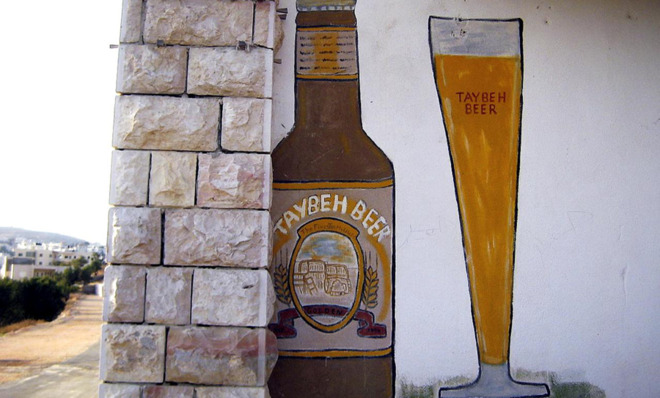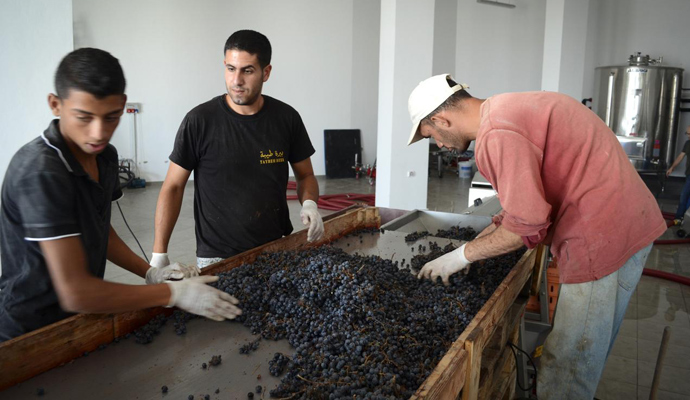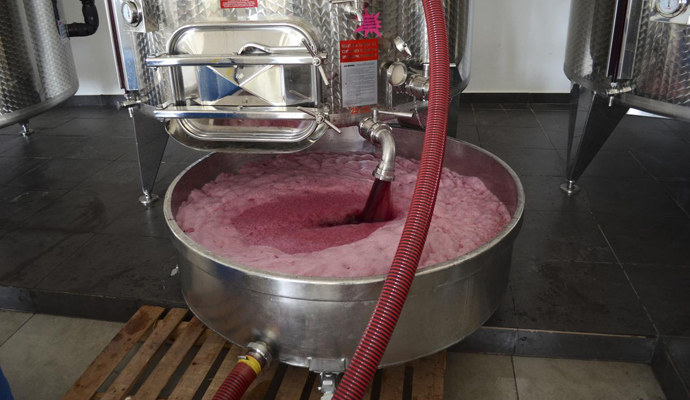The booze baron of the West Bank
In a land where neither business nor booze is known to prosper, one enterprising Palestinian turns hops and locally grown grapes into both profit and pride

A free daily email with the biggest news stories of the day – and the best features from TheWeek.com
You are now subscribed
Your newsletter sign-up was successful

In an otherwise sleepy village 12 miles northeast of Jerusalem lies a markedly bustling hub of activity, where crates full of grapes and hops are brought in and full boxes of clinking bottles are brought out. Welcome to Taybeh, the only center for wine and beer production in the West Bank, and the first microbrewery in the Middle East.
"Taste the revolution," the poster on the door invites. Inside the Taybeh Brewery headquarters, men patrol a conveyer belt of brown bottles, checking that everything is fine each step of the way. Tiny Palestinian flags are draped across the roof, hanging above large steel barrels where malt, barley, and hops are being mixed with water from Ein Samia, a spring around 12 miles north of Ramallah. Next door is a different scene. Four men huddle around a big vat of grapes and verify their quality before they're churned into liquid. In the corner, a man tests the acidity of the wine by pouring it into various test tubes.
(More from Narratively: Fracking up a storm)
The Week
Escape your echo chamber. Get the facts behind the news, plus analysis from multiple perspectives.

Sign up for The Week's Free Newsletters
From our morning news briefing to a weekly Good News Newsletter, get the best of The Week delivered directly to your inbox.
From our morning news briefing to a weekly Good News Newsletter, get the best of The Week delivered directly to your inbox.
The Taybeh Brewery was started in 1995 amid the temporary stability that followed the Oslo peace accords. Nadim Khoury, who had previously studied brewing in Boston, scraped together $1.2 million and, with his family, which is part of a Christian Palestinian minority, launched the brewery named for the town; "taybeh" fittingly means "delicious" in Arabic. It's a family affair, with Nadim at the helm. His daughter, Madees, who has shown a passion for beer since the age of ten, is poised to take over the brewery, while his son, Canaan, a fresh graduate from Harvard, is set to assume control of the new winery.
Its unusual location in the last all-Christian community in the Muslim-dominated West Bank has not stopped the business from growing steadily over the years. Since its establishment, it has remained the only brewery in the Palestinian territories. Having started off with a small local distribution, it has now developed somewhat of a cult following — not only regionally, but around the world. The company is now exporting to Japan, Germany, Belgium, and Sweden, and can be found in bars across the Palestinian territories and Israel. Its crude but cheerful branding depicting an old-fashioned brewery and a bubbly, overflowing mug of beer is hard to miss among the much simpler labels of other regional beers, such as Israel's Goldstar and Lebanon's Almaza.
Drinkers can choose from a selection of golden, light, dark, and even non-alcoholic Halal beer, the latter recently added to appeal to Muslim drinkers. The brewery gets its hops from the Czech Republic, its barley from France, and brews according to the Bavarian purity law of 1516, which involves the usage of spring water. The dark variety, a stout, follows the classic method monks used to brew beer in the Middle Ages in order to strengthen themselves during their fasting.
In the country where Jesus once turned water into wine, it seemed only a matter of time before Taybeh expanded and went into the wine business. Grapes are currently the second-largest agricultural crop produced in the country after olives, and Nadim sees wine as a natural way to grow his business while also helping local farmers.
A free daily email with the biggest news stories of the day – and the best features from TheWeek.com

"We have many farmers in Palestine that grow grapes," says Nadim. "We thought of making an identity for Palestinian wine because there are so many good grapes, but no good wineries."
Nadim and his son Canaan have been practicing winemaking for the past four years in the basement of their home. "My son Canaan says he wants to do something different. He always practiced with making wine in Boston, so I convinced him to open the first boutique winery" in the West Bank, says Nadim.
Palestine has been producing wine since biblical times. Its dry climate and high elevation make it an ideal setting. "The climate is great," says Canaan. "We have the elevations over about 900 meters above sea level, which is good for the varieties we have. The temperature is good and so is the humidity."
However, Nadim and his son are restricted in the amount of grapes and the varieties that they can purchase. "The local varieties are not suitable for winemaking — they're more of a table grape. We have been fortunate enough to have varieties in neighboring cities like Syrah, Cabernet, Merlot, which is what we're making right now," says Canaan.
It's an organic process that takes and gives back to local farmers and producers. The grapes come from the nearby villages of Aboud and Birzeit. In the next few years, Nadim is hoping to be able to harvest grapes from his own vineyard in Taybeh. Additionally, "we give most of our leftovers from crushing to the local farmers to give to their sheep and cows for free," says Canaan.
(More from Narratively: Romancing the ranch)
Grown by local farmers, the Cabernet Sauvignon, Merlot and Syrah grapes are also sold to Israeli settlers in the West Bank, who in turn make the wine and export it as Israeli wine. The only two other Palestinian wineries, Cremisan and Latrun, have had their vineyards annexed by Israel, which technically makes Taybeh the only Palestinian winery. Latrun was captured by Israel in the Six Day War of 1967. Cremisan, where wine has been produced on the outskirts of Bethlehem since the Iron Age, is sandwiched between two Israeli settlements, and in April of this year it was earmarked to lie on the Israeli side of the "separation wall." Thus, it's been cut off from the rest of the West Bank.
Taybeh is planning to release its first bottle in January 2014. "We aim to enter the Palestinian market initially, and afterwards go into the Israeli and then international markets, following a similar marketing approach as our brewery," says Canaan.
Nadim sees his brewery and winery not only as a business, but a way of giving back to the community by helping grow the local economy, and even as a way to counter the occupation. "As a Palestinian business going through all the difficulties we face from the occupation, we still remain in business and are successfully growing and producing high-quality products, exporting abroad and competing with Israeli products," he says. "This is our stance against the occupation."
Starting a business on occupied land has been no walk in the park. Everything coming in or out must go through checkpoints, and often the things being checked sit there for days. Uprisings and protests in the volatile region can seal the borders up in minutes, making movement — like the exportation and distribution of beer — impossible.
The beer is unpasteurized, like many microbrews, in order to maintain freshness and flavor, which also means the optimal shelf life is reduced to around four months, making it prone to spoilage if left exposed to light or heat. This hampers Taybeh's ability to export overseas.

In a state where water distribution is controlled by the Israeli government, the distilling process, which requires the use of spring water, is also a constant challenge. The taps are turned on only about once every 20 days. "Since water is controlled by the Israelis and the quantity the Israelis give to the Palestinians is limited, our business is affected by water shortages," says Nadim. "When we do get water coming to the brewery, we store it on the roof of the brewery, yet it is still not enough."
Getting the raw material for the bottles and labels has also proven difficult. With no bottle manufacturers in the West Bank, the Khourys bought their bottles from Portugal. But, they say, the Israeli authorities have essentially forced them to begin buying both their wine and beer bottles from an Israeli company by making it very hard for them to import raw materials from elsewhere. This, and the fact that they sell and distribute their product across Israel, has brought people to question their dedication to the Palestinian economy and identity, which Nadim has tried to address by keeping the product as local as possible. Aside from these tensions, the Khorys say they haven't heard from Muslim or any other religious leaders opposed to alcohol consumption.
(More from Narratively: Graves of cotton)
The biggest challenge faced by Taybeh is to persuade the local and international markets. Years of heavily restricted trade and a virtually non-existent ministry of health means the international market often questions the quality of Palestinian products.
"You can make a book about the different challenges we have. In terms of the brewery, it's completely different because we suffer from the occupation, the seizure, the closure of the wall," says Nadim. "Yesterday, we received a shipment of hops that came for the brewery — it was for almost a month at the Israeli port [Ashtun]. We have no port yet for Palestine so we still suffer from many obstacles. The winery is different because we don't have to bring in the raw material from abroad."
Read the rest of this story at Narratively.
Narratively is an online magazine devoted to original, in-depth and untold stories. Each week, Narratively explores a different theme and publishes just one story a day. It was one of Time's 50 Best Websites of 2013.